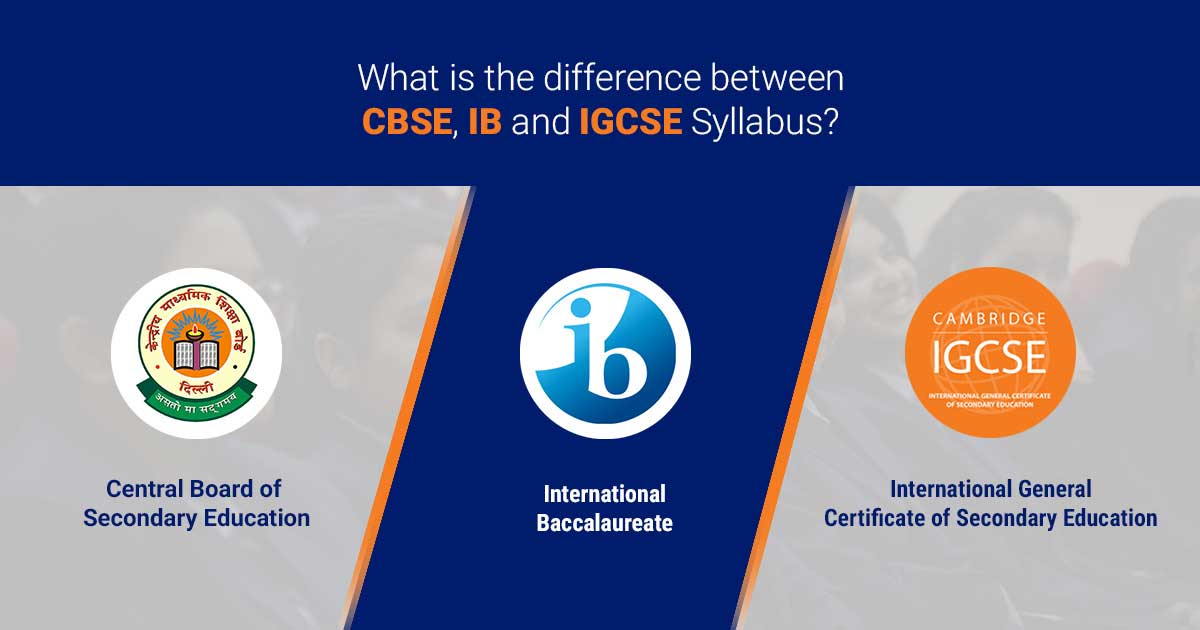

What Is The Difference Between CBSE, IB And IGCSE Syllabus?
A Brief Introduction
When it comes to the beginning of the admission sessions in India, students and parents start thinking about an ideal board to further their studies. The main goal of this research is to find a board with features that can be aligned with your future academic requirements. The post focuses on the comparison between three of the most sought-after educational boards in India, which are CBSE, IB, and IGCSE.
A Quick Comparison Between CBSE, IB, and IGCSE
CBSE:
CBSE stands for Central Board of Secondary Education. Being one of the prominent education boards in India, CBSE serves many educational institutions with immense success. All central schools, private schools, and Jawahar Navodaya Vidyalayas are affiliated with this board. In addition, the majority of educational institutions, approved by the Central Government of India, are also affiliated with CBSE.
CBSE follows the AISSCE (All India Senior School Certificate Examination) examination pattern for Class 10 as well as Class 12. A total of 14808 schools in India are affiliated with the Central Board of Secondary Education. In short, CBSE operates in 25 countries, such as India, Dubai, Malaysia, and so on. The syllabus of many major entrance exams in India is based on CBSE. CBSE offers predefined combinations of different subjects designed for various streams.
IB:
IB stands for International Baccalaureate. Started the journey in 1968 and headquartered in Geneva, Switzerland, IB comes as an international educational foundation. When it comes to the examination pattern, IB offers three educational programs.
The first one is the Primary Year Program (PYP) for KG to Class-5. The second one is the Middle Year Program (MYP) for Class- 6 to Class- 10. And the last one is the Diploma Program (DP), which serves Class- 11 and Class- 12. IB comes with six diverse subject groups from which students need to opt for one per group.
If you check the statistics, you would find that there are around 130 educational institutions in India affiliated with IB whereas the number is around 3500 throughout the world. If you are planning to study abroad in the upcoming years, then IB can serve as an ideal education board for you due to its recognition in the majority of global universities.
IGCSE:
The curriculum of IGCSE is internationally recognized, in-depth, and specialized. As an IGCSE-board student, you have to take exams in the English language.
The International General Certificate of Secondary Education aims to prepare students for International Baccalaureate (IB) as well as CIE (Cambridge International Examinations) A-level. The examination pattern of IGCSE consists of Cambridge Primary, Cambridge Secondary 1, Cambridge Secondary 2, and Cambridge Advanced. There are around 200 educational institutions in India affiliated with IGCSE. The board operates in 120 countries, such as India, the UK, and the USA.
Did you know the majority of Universities throughout the world accept International Board? Even if you are a student of IGCSE, you can opt to apply to many Foreign Universities, which do not accept the ICSE and CBSC boards. Moreover, you can get to opt for your favorite subjects from an abundance of options.
IGCSE prioritizes the English language and advanced technical subjects. In addition, an advanced curriculum makes students take their knowledge and skills to the next level.
Recent Blogs
IGCSE Full Form
What is the International Baccalaureate?
IBDP Full Form
CIE Board Full Form
CBSE Full Form
Site Designed and Maintained By : Office of Communications, JAIN Group All rights reserved.